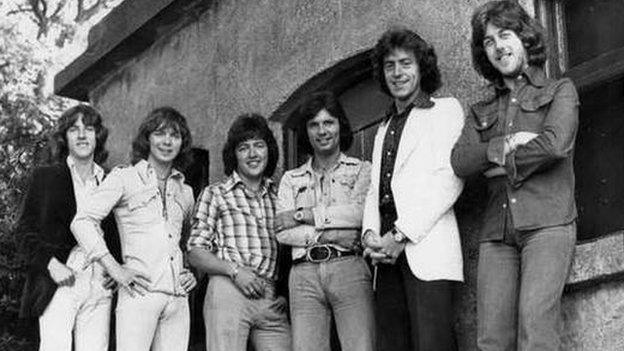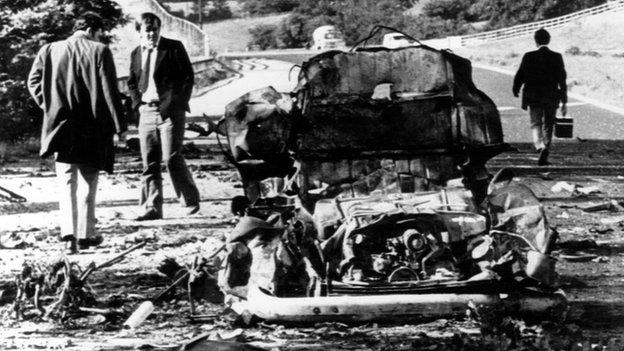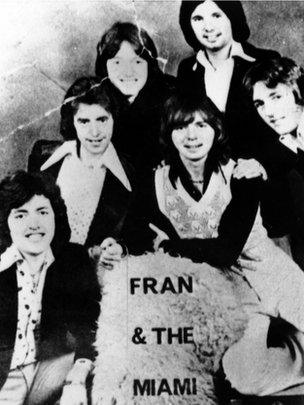Miami Showband: Massacre devastated Northern Ireland live music scene
- Published

The Miami Showband massacre in 1975 was the first time musicians had been targeted by a terrorist group in Northern Ireland
When three young musicians lost their lives on 31 July 1975, the heart was torn out of Ireland's showband community.
It also devastated the burgeoning live music scene in Northern Ireland.
Forty years later, the Miami Showband massacre, external remains one of the darkest atrocities of the Troubles.
Lead singer Fran O'Toole, guitarist Tony Geraghty and trumpeter Brian McCoy were shot dead on a country road after a gig in Banbridge, County Down.
Singer Des Lee and guitarist Stephen Travers survived the tragedy despite being shot.
The massacre was carried out by paramilitary group the Ulster Volunteer Force (UVF), who had planned to load a bomb on to the bus and have it explode as the band drove south to Dublin.
It was the first time musicians had been deliberately targeted by a terrorist group in Northern Ireland and it shocked everyone in all genres of the Irish music scene.
Fr Brian D'Arcy was a fan and a friend of The Miami Showband musicians and unofficial chaplain to the showband community.
'National anthem'
A huge showband fan, he would attend up to 40 dances a week.
"Before the massacre, bands played anywhere and everywhere," he says.
"The only time they thought about where they were and who they were playing to was when they asked the dancehall owner which national anthem to play at the end of the evening.
"Showbands were composed of members from north and south, Protestant and Catholic.
"The Miami was a good example - three of them from the north and three from the south. Three Presbyterian, one Church of Ireland and two Roman Catholics."
Fr D'Arcy admits the showband era was nearing the end in the mid-1970s, but says the "heart went completely out of the community after the massacre".
"In its heyday, there were maybe 600 showbands touring Ireland. At the end of the 1970s there were less than 100," he says.
"After what happened to the Miami it was hard to get any bands to come to Northern Ireland.

Three members of the Miami Showband were murdered by the UVF
"The bands didn't feel safe, the fans didn't feel safe. No one felt safe."
Journalist and former band manager Colin McClelland says the Miami Showband massacre had a "devastating effect on the whole live music scene in Northern Ireland".
"Some Northern Ireland-based bands still attempted to travel in areas with which they were familiar," he says.
"But almost all of the southern-based bands - and there were many - stopped travelling to gigs in the north.
"With a few exceptions, the bands felt that the risk had now become too great to continue and many rural showband venues closed down altogether.
"Most British rock bands immediately took Belfast off their UK tour itineraries because of the publicity surrounding the massacre.
"Only those with an affinity to Northern Ireland, such as Rory Gallagher, insisted upon Belfast remaining on their tour schedule.
Awareness
Blues and jazz musician Ronnie Greer was in his 20s when the massacre took place.
He began his musical career in a showband - The Secrets - where he played alongside Miami member Brian McCoy.
After the massacre, he continued playing live, but with a new awareness of the risks involved.
"It was Brian who gave me my first job in a band," he says.
"I was only in my late teens and had secured an audition. Brian collected me and I told him how much I wanted the job.
"He told me not to worry - it was already mine.
"However, he added that he would only be around for a few months as he had got a full-time job with the Miami Showband.
"When I heard about the massacre, I couldn't drive. I had to get out of the car and sit on the bonnet for 15 minutes.
"I still get upset about it.

This picture of the Miami Showband was found in the wreckage of their minibus
"Brian was a very enthusiastic and cheerful guy and was over-the-moon at being able to give up his job in the Spinning Mill in Belfast and become a full-time musician."
Ronnie had moved on to jazz and blues when the massacre happened, but he admits that what happened affected the whole music community in Ireland.
"Up until then, all musicians enjoyed a free pass - we weren't targets for any organisation and we had no bother travelling anywhere," he says.
"We started thinking about security more, how safe it was to go somewhere … however, we still played.
"Maybe it was the arrogance of youth that made us believe it couldn't happen to us, or maybe it was an act of defiance, but the music was the most important thing."
Gerry McWhinney was also a member of the Secrets and knew the Miami Showband members well.
"Brian was on trumpet and vocals with the Secrets and I was on bass," he says.
"We knew the Miami through doing warm up for them before Big Band nights.
Talented
"Like Brian they were young, talented, professional and ambitious musicians.
"The Miami management team arrived unannounced one night, listened to the Secrets and offered Brian a place.
"In today's terms it was like being offered One Direction or Take That.
"The massacre shocked us all. We thought showbands were surrounded by a protective veil as we travelled at night, and we just could not believe what had happened.
"It was a shocking blow. There was a dullness for a long time afterwards.
"However, we played on. We were aware of security needs and the Troubles, but we just kept going."
He added: "I don't think it was an overt decision to continue, we just did.
"I think we just loved music too much to stop."